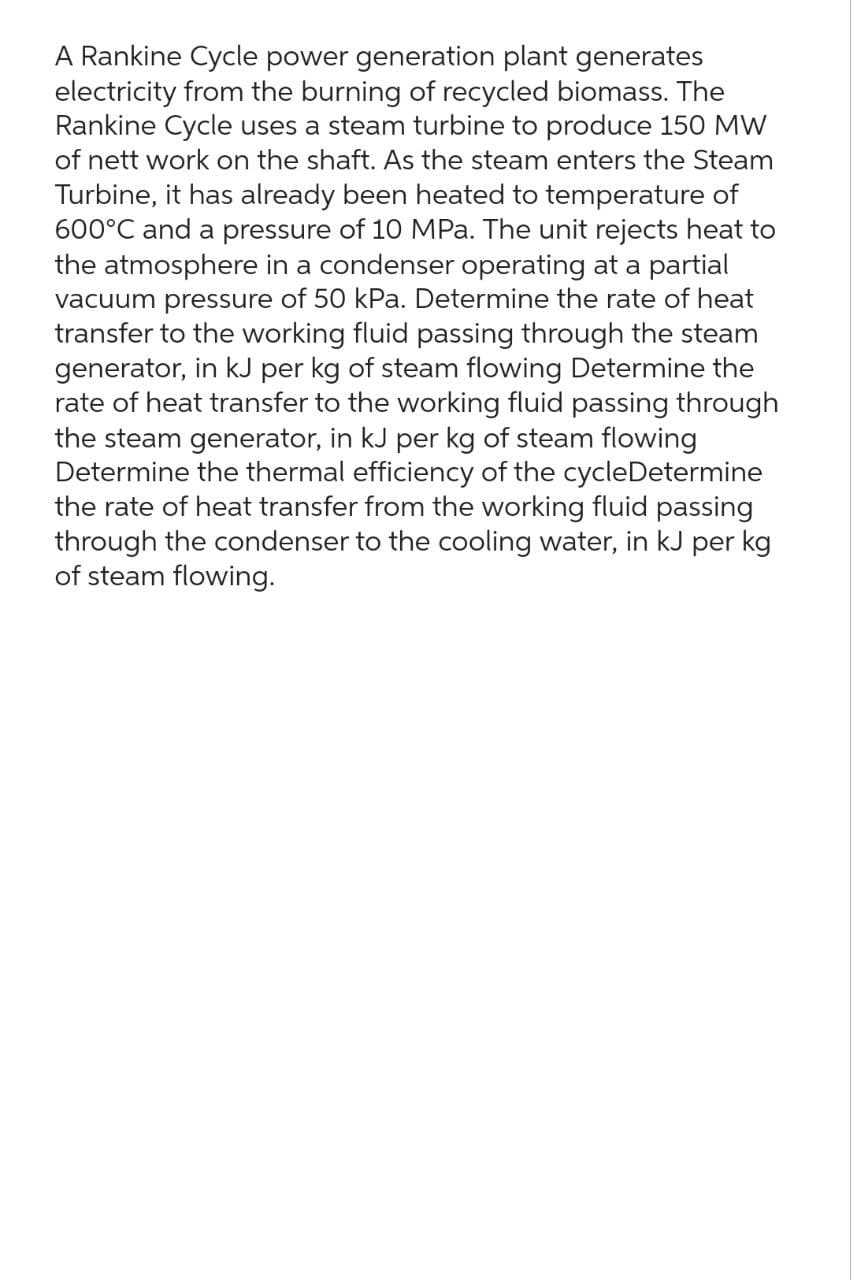A Rankine Cycle power generation plant generates electricity from the burning of recycled biomass. The Rankine Cycle uses a steam turbine to produce 150 MW of nett work on the shaft. As the steam enters the Steam Turbine, it has already been heated to temperature of 600°C and a pressure of 10 MPa. The unit rejects heat to the atmosphere in a condenser operating at a partial vacuum pressure of 50 kPa. Determine the rate of heat transfer to the working fluid passing through the steam generator, in kJ per kg of steam flowing Determine the rate of heat transfer to the working fluid passing through the steam generator, in kJ per kg of steam flowing Determine the thermal efficiency of the cycleDetermine the rate of heat transfer from the working fluid passing through the condenser to the cooling water, in kJ per kg of steam flowing.
A Rankine Cycle power generation plant generates electricity from the burning of recycled biomass. The Rankine Cycle uses a steam turbine to produce 150 MW of nett work on the shaft. As the steam enters the Steam Turbine, it has already been heated to temperature of 600°C and a pressure of 10 MPa. The unit rejects heat to the atmosphere in a condenser operating at a partial vacuum pressure of 50 kPa. Determine the rate of heat transfer to the working fluid passing through the steam generator, in kJ per kg of steam flowing Determine the rate of heat transfer to the working fluid passing through the steam generator, in kJ per kg of steam flowing Determine the thermal efficiency of the cycleDetermine the rate of heat transfer from the working fluid passing through the condenser to the cooling water, in kJ per kg of steam flowing.
Elements Of Electromagnetics
7th Edition
ISBN:9780190698614
Author:Sadiku, Matthew N. O.
Publisher:Sadiku, Matthew N. O.
ChapterMA: Math Assessment
Section: Chapter Questions
Problem 1.1MA
Related questions
Question

Transcribed Image Text:A Rankine Cycle power generation plant generates
electricity from the burning of recycled biomass. The
Rankine Cycle uses a steam turbine to produce 150 MW
of nett work on the shaft. As the steam enters the Steam
Turbine, it has already been heated to temperature of
600°C and a pressure of 10 MPa. The unit rejects heat to
the atmosphere in a condenser operating at a partial
vacuum pressure of 50 kPa. Determine the rate of heat
transfer to the working fluid passing through the steam
generator, in kJ per kg of steam flowing Determine the
rate of heat transfer to the working fluid passing through
the steam generator, in kJ per kg of steam flowing
Determine the thermal efficiency of the cycleDetermine
the rate of heat transfer from the working fluid passing
through the condenser to the cooling water, in kJ per kg
of steam flowing.
Expert Solution
This question has been solved!
Explore an expertly crafted, step-by-step solution for a thorough understanding of key concepts.
Step by step
Solved in 5 steps with 1 images

Knowledge Booster
Learn more about
Need a deep-dive on the concept behind this application? Look no further. Learn more about this topic, mechanical-engineering and related others by exploring similar questions and additional content below.Recommended textbooks for you

Elements Of Electromagnetics
Mechanical Engineering
ISBN:
9780190698614
Author:
Sadiku, Matthew N. O.
Publisher:
Oxford University Press

Mechanics of Materials (10th Edition)
Mechanical Engineering
ISBN:
9780134319650
Author:
Russell C. Hibbeler
Publisher:
PEARSON

Thermodynamics: An Engineering Approach
Mechanical Engineering
ISBN:
9781259822674
Author:
Yunus A. Cengel Dr., Michael A. Boles
Publisher:
McGraw-Hill Education

Elements Of Electromagnetics
Mechanical Engineering
ISBN:
9780190698614
Author:
Sadiku, Matthew N. O.
Publisher:
Oxford University Press

Mechanics of Materials (10th Edition)
Mechanical Engineering
ISBN:
9780134319650
Author:
Russell C. Hibbeler
Publisher:
PEARSON

Thermodynamics: An Engineering Approach
Mechanical Engineering
ISBN:
9781259822674
Author:
Yunus A. Cengel Dr., Michael A. Boles
Publisher:
McGraw-Hill Education

Control Systems Engineering
Mechanical Engineering
ISBN:
9781118170519
Author:
Norman S. Nise
Publisher:
WILEY

Mechanics of Materials (MindTap Course List)
Mechanical Engineering
ISBN:
9781337093347
Author:
Barry J. Goodno, James M. Gere
Publisher:
Cengage Learning

Engineering Mechanics: Statics
Mechanical Engineering
ISBN:
9781118807330
Author:
James L. Meriam, L. G. Kraige, J. N. Bolton
Publisher:
WILEY